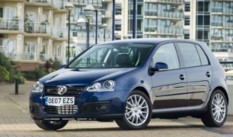Review

Size doesn’t matter as much as it used to for company car drivers.
The days of badge envy when a 1.6 logo would be overshadowed by the greatness of a 2.0-litre are slowly being forgotten.
Manufacturers are now following the route of washing powder, stereo speakers and iPods in proving smaller is better. Half the size, double the power.
Take the Volkswagen Golf 1.4 TSI engine, fitted to our test GT Sport.
A 1.4-litre used to be barely adequate for a Ford Fiesta, but with a bit of jiggery-pokery it now offers 138bhp (there is also a 168bhp engine).
Basically, the TSI engine takes the excellent Volkswagen direct injection petrol engine and then straps on an engine-driven supercharger for extra pulling power at low revs, reaching 162lb-ft of torque from just 1,750rpm, and a turbocharger for more boost at higher revs.
Extra torque and boost means the engine has very high gearing and flexible power throughout the rev range from 1,000 to 6,500rpm.
This equates to a sub-nine second 0-62mph time and a top speed of 127mph, while still achieving an average 39mpg.
In real-world driving, the Golf is a viable alternative to a diesel engine, with surprising flexibility for such a small engine.
In third gear, it can pull strongly all the way from 20mph to 70mph and well beyond with out a hint of power running out.
Even with a full complement of passengers and luggage, the engine doesn’t feel overwhelmed and easily achieved the stated average, with the trip computer suggesting 45mpg is easily achievable in normal driving.
Push harder and when accelerating from a standstill there is a noticeable mechanical whine as the supercharger does its work, but it adds to the sporting nature of this car.
The suspension keeps the car level in hard cornering, but can feel unsettled at lower speeds.
Inside, there are some subtle touches to emphasise the car’s sporting nature, including a steering wheel badge. However, it lacks wheel-mounted stereo controls.
A wide range of safety equipment includes ESP anti-skid control, airbags galore, sports seats with height and lumbar adjustment and suspension that sits the car 15mm lower than a standard Golf.
Diesel accounts for 55% of Golf sales overall, with a higher percentage in the fleet market, as drivers target the lowest emitting cars to keep their tax bills down, but the TSI is a viable alternative.
The TSI Golf emits 169g/km of CO2, which puts it into the 20% tax band this year and 21% next year, while the equivalent 2.0 TDI 138bhp diesel falls into the 19% tax band and offers an extra 12mpg on the combined cycle.
However, you pay £1,000 more for the diesel, which wipes out any tax advantage and it only achieves £100 more than the petrol on disposal after three years/60,000 miles.
But while the TSI performs strongly against an equivalent diesel, it has a harder fight against some petrol-powered rivals.

Fact file
P11D value: £17,707
CO2 emissions (g/km): 169
BIK % of P11D in 2007: 20%
Graduated VED rate: £165
Insurance group: 13E
Combined mpg: 39.8
CAP RV (3yr/60k): £7,650/43%
Monthly lease (3yr/60k): £354
Positive:
Negative:
THREE RIVALS TO CONSIDER
P11D PRICE
Without traditional engine size as a benchmark, finding competitors for these sporty hatches becomes more complicated. The Renault is one of the cheapest but offers 165bhp, while the Honda and Vauxhall match the Volkswagen, with a figure of 138bhp.
Vauxhall: £16,085
Renault: £16,745
Honda: £17,237
Volkswagen: £17,707
EMISSIONS AND TAX RATES
Despite its larger engine and similar power, the Honda undercuts the Volkswagen in tax. A 22% taxpayer in the Honda would pay £57 a month, with the Golf driver paying £65. The Megane matches the Vauxhall in tax, but the Astra’s lower P11D price puts it ahead.
Honda: 156g/km/18%
Volkswagen: 169g/km/20%
Renault : 180g/km/23%
Vauxhall: 180g/km/23%
SMR COST
Despite the amount of new technology under the bonnet, the Volkswagen has the lowest predicted SMR costs over 60,000 miles, showing continuing confidence in reliability. Honda almost matches the Golf, but the Vauxhall and Renault lag behind.
Volkswagen : 3.89 (pence per mile) /£2,334 (60,000 mile total)
Honda: 3.96/£2,376
Vauxhall: 4.74/£2,844
Renault: 5.27/£3,162
FUEL COST
The Honda is the only car that breaks the 40mpg barrier, achieving 42.8 combined, while the Volkswagen is more than £400 adrift. The Vauxhall is a close third on 37.7mpg and even the powerful Megane manages to muster a respectable 36.7mpg.
Honda: 10.26 (pence per mile)/£6,156 (60,000 mile total)
Volkswagen: 11.03/£6,618
Vauxhall: 11.64/£6,984
Renault: 11.96/£7,176
DEPRECIATION COST
The Volkswagen puts its competitors in the shade by retaining 43% of its value after 60,000 miles, nearly £700 ahead of its nearest rival. The Renault, despite its competitive front-end price, holds just 26% of its value over the same period, just beaten by the Vauxhall on 30%.
Volkswagen: 16.76 (pence per mile) /£10,056 (60,000 miles total)
Honda: 17.85/£10,710
Vauxhall : 18.89/£11,334 Renault: 20.78/£12,468
WHOLELIFE COST
A consistently strong performance in all wholelife cost areas puts the Golf on top, matched closely by the Honda. The rivals are disadvantaged mainly by much heavier depreciation, which manages to turn the much cheaper Renault into the most expensive model in our test.
Volkswagen : 31.68 (pence per mile) /£19,008 (60,000 miles total)
Honda: 32.07/£19,242
Vauxhall : 35.27/£21,162
Renault: 38.01/£22,806
VERDICT
Despite its diminutive engine size, the Volkswagen packs a real punch and easily defeats rival heavyweights who promised more power per pound.
If you want outright power, then the Megane is an obvious choice, but in this company, the sound financial decision comes down to the Honda and Volkswagen.
While the Civic is a close running cost match, the Golf engine offers such a power combination of power, flexibility, economy and refinement that it takes the honours here.

















Ansaar - 28/03/2014 17:14
hello,I've a GOLF GT 1.4T YEAR 2006,i want to change the engine and put the AGU ENGINE 1.8T,can someone help me Thanks